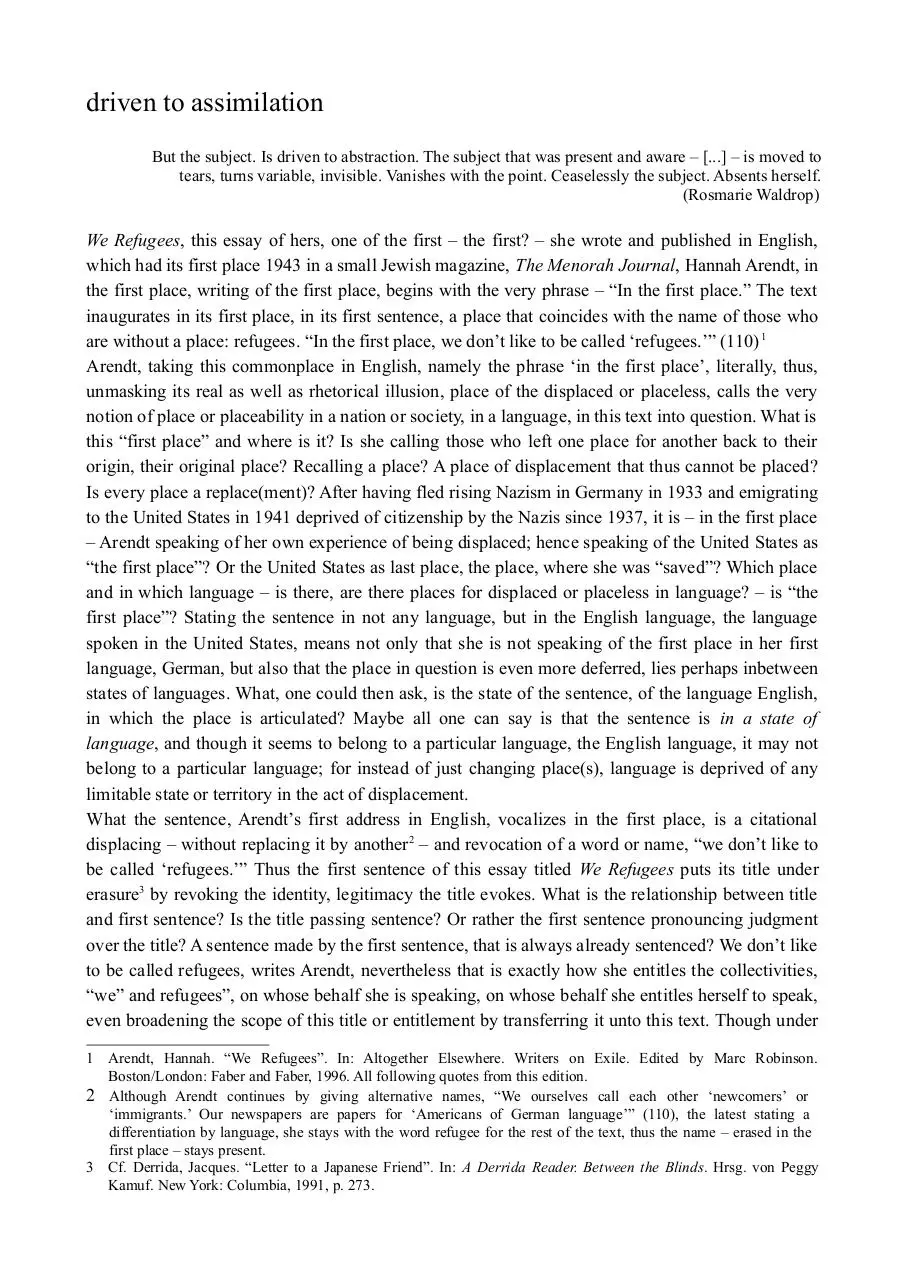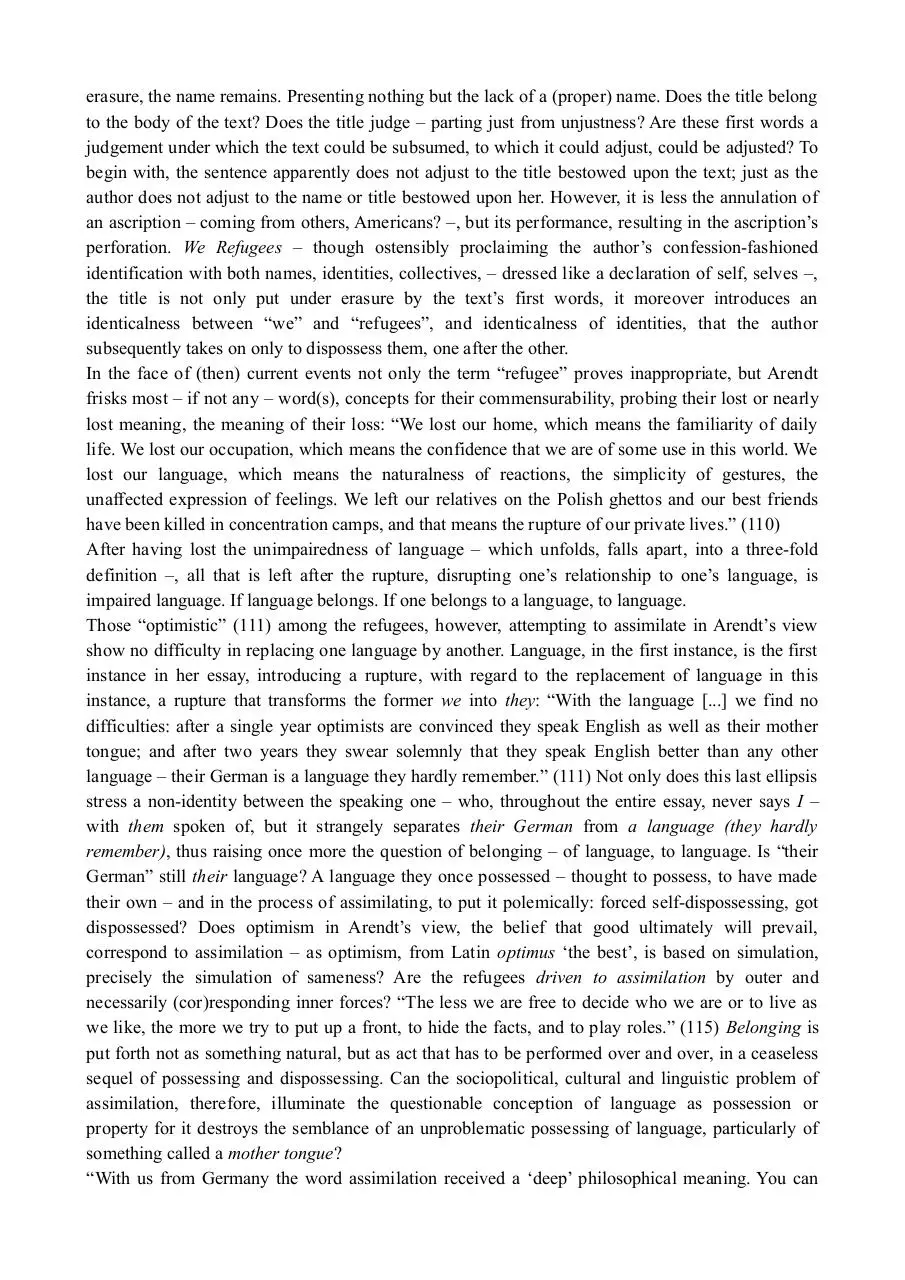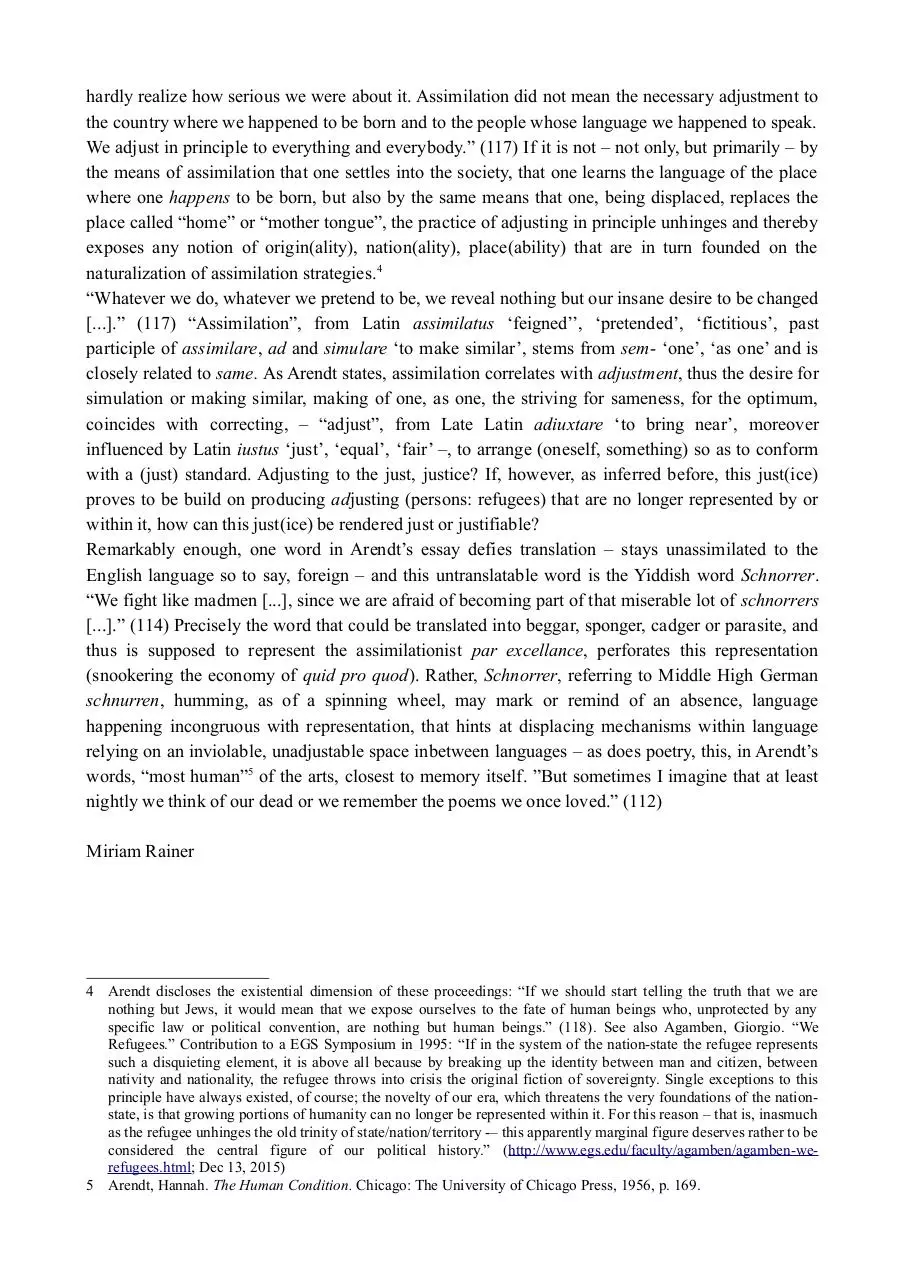mr driven to assimilation1101 (PDF)
File information
Author: Miriam Rainer
This PDF 1.4 document has been generated by Writer / OpenOffice.org 3.2, and has been sent on pdf-archive.com on 06/02/2019 at 14:48, from IP address 194.94.x.x.
The current document download page has been viewed 290 times.
File size: 78.76 KB (3 pages).
Privacy: public file



File preview
driven to assimilation
But the subject. Is driven to abstraction. The subject that was present and aware – [...] – is moved to
tears, turns variable, invisible. Vanishes with the point. Ceaselessly the subject. Absents herself.
(Rosmarie Waldrop)
We Refugees, this essay of hers, one of the first – the first? – she wrote and published in English,
which had its first place 1943 in a small Jewish magazine, The Menorah Journal, Hannah Arendt, in
the first place, writing of the first place, begins with the very phrase – “In the first place.” The text
inaugurates in its first place, in its first sentence, a place that coincides with the name of those who
are without a place: refugees. “In the first place, we don’t like to be called ‘refugees.’” (110) 1
Arendt, taking this commonplace in English, namely the phrase ‘in the first place’, literally, thus,
unmasking its real as well as rhetorical illusion, place of the displaced or placeless, calls the very
notion of place or placeability in a nation or society, in a language, in this text into question. What is
this “first place” and where is it? Is she calling those who left one place for another back to their
origin, their original place? Recalling a place? A place of displacement that thus cannot be placed?
Is every place a replace(ment)? After having fled rising Nazism in Germany in 1933 and emigrating
to the United States in 1941 deprived of citizenship by the Nazis since 1937, it is – in the first place
– Arendt speaking of her own experience of being displaced; hence speaking of the United States as
“the first place”? Or the United States as last place, the place, where she was “saved”? Which place
and in which language – is there, are there places for displaced or placeless in language? – is “the
first place”? Stating the sentence in not any language, but in the English language, the language
spoken in the United States, means not only that she is not speaking of the first place in her first
language, German, but also that the place in question is even more deferred, lies perhaps inbetween
states of languages. What, one could then ask, is the state of the sentence, of the language English,
in which the place is articulated? Maybe all one can say is that the sentence is in a state of
language, and though it seems to belong to a particular language, the English language, it may not
belong to a particular language; for instead of just changing place(s), language is deprived of any
limitable state or territory in the act of displacement.
What the sentence, Arendt’s first address in English, vocalizes in the first place, is a citational
displacing – without replacing it by another2 – and revocation of a word or name, “we don’t like to
be called ‘refugees.’” Thus the first sentence of this essay titled We Refugees puts its title under
erasure3 by revoking the identity, legitimacy the title evokes. What is the relationship between title
and first sentence? Is the title passing sentence? Or rather the first sentence pronouncing judgment
over the title? A sentence made by the first sentence, that is always already sentenced? We don’t like
to be called refugees, writes Arendt, nevertheless that is exactly how she entitles the collectivities,
“we” and refugees”, on whose behalf she is speaking, on whose behalf she entitles herself to speak,
even broadening the scope of this title or entitlement by transferring it unto this text. Though under
1 Arendt, Hannah. “We Refugees”. In: Altogether Elsewhere. Writers on Exile. Edited by Marc Robinson.
Boston/London: Faber and Faber, 1996. All following quotes from this edition.
2 Although Arendt continues by giving alternative names, “We ourselves call each other ‘newcomers’ or
‘immigrants.’ Our newspapers are papers for ‘Americans of German language’” (110), the latest stating a
differentiation by language, she stays with the word refugee for the rest of the text, thus the name – erased in the
first place – stays present.
3 Cf. Derrida, Jacques. “Letter to a Japanese Friend”. In: A Derrida Reader. Between the Blinds. Hrsg. von Peggy
Kamuf. New York: Columbia, 1991, p. 273.
erasure, the name remains. Presenting nothing but the lack of a (proper) name. Does the title belong
to the body of the text? Does the title judge – parting just from unjustness? Are these first words a
judgement under which the text could be subsumed, to which it could adjust, could be adjusted? To
begin with, the sentence apparently does not adjust to the title bestowed upon the text; just as the
author does not adjust to the name or title bestowed upon her. However, it is less the annulation of
an ascription – coming from others, Americans? –, but its performance, resulting in the ascription’s
perforation. We Refugees – though ostensibly proclaiming the author’s confession-fashioned
identification with both names, identities, collectives, – dressed like a declaration of self, selves –,
the title is not only put under erasure by the text’s first words, it moreover introduces an
identicalness between “we” and “refugees”, and identicalness of identities, that the author
subsequently takes on only to dispossess them, one after the other.
In the face of (then) current events not only the term “refugee” proves inappropriate, but Arendt
frisks most – if not any – word(s), concepts for their commensurability, probing their lost or nearly
lost meaning, the meaning of their loss: “We lost our home, which means the familiarity of daily
life. We lost our occupation, which means the confidence that we are of some use in this world. We
lost our language, which means the naturalness of reactions, the simplicity of gestures, the
unaffected expression of feelings. We left our relatives on the Polish ghettos and our best friends
have been killed in concentration camps, and that means the rupture of our private lives.” (110)
After having lost the unimpairedness of language – which unfolds, falls apart, into a three-fold
definition –, all that is left after the rupture, disrupting one’s relationship to one’s language, is
impaired language. If language belongs. If one belongs to a language, to language.
Those “optimistic” (111) among the refugees, however, attempting to assimilate in Arendt’s view
show no difficulty in replacing one language by another. Language, in the first instance, is the first
instance in her essay, introducing a rupture, with regard to the replacement of language in this
instance, a rupture that transforms the former we into they: “With the language [...] we find no
difficulties: after a single year optimists are convinced they speak English as well as their mother
tongue; and after two years they swear solemnly that they speak English better than any other
language – their German is a language they hardly remember.” (111) Not only does this last ellipsis
stress a non-identity between the speaking one – who, throughout the entire essay, never says I –
with them spoken of, but it strangely separates their German from a language (they hardly
remember), thus raising once more the question of belonging – of language, to language. Is “their
German” still their language? A language they once possessed – thought to possess, to have made
their own – and in the process of assimilating, to put it polemically: forced self-dispossessing, got
dispossessed? Does optimism in Arendt’s view, the belief that good ultimately will prevail,
correspond to assimilation – as optimism, from Latin optimus ‘the best’, is based on simulation,
precisely the simulation of sameness? Are the refugees driven to assimilation by outer and
necessarily (cor)responding inner forces? “The less we are free to decide who we are or to live as
we like, the more we try to put up a front, to hide the facts, and to play roles.” (115) Belonging is
put forth not as something natural, but as act that has to be performed over and over, in a ceaseless
sequel of possessing and dispossessing. Can the sociopolitical, cultural and linguistic problem of
assimilation, therefore, illuminate the questionable conception of language as possession or
property for it destroys the semblance of an unproblematic possessing of language, particularly of
something called a mother tongue?
“With us from Germany the word assimilation received a ‘deep’ philosophical meaning. You can
hardly realize how serious we were about it. Assimilation did not mean the necessary adjustment to
the country where we happened to be born and to the people whose language we happened to speak.
We adjust in principle to everything and everybody.” (117) If it is not – not only, but primarily – by
the means of assimilation that one settles into the society, that one learns the language of the place
where one happens to be born, but also by the same means that one, being displaced, replaces the
place called “home” or “mother tongue”, the practice of adjusting in principle unhinges and thereby
exposes any notion of origin(ality), nation(ality), place(ability) that are in turn founded on the
naturalization of assimilation strategies. 4
“Whatever we do, whatever we pretend to be, we reveal nothing but our insane desire to be changed
[...].” (117) “Assimilation”, from Latin assimilatus ‘feigned’’, ‘pretended’, ‘fictitious’, past
participle of assimilare, ad and simulare ‘to make similar’, stems from sem- ‘one’, ‘as one’ and is
closely related to same. As Arendt states, assimilation correlates with adjustment, thus the desire for
simulation or making similar, making of one, as one, the striving for sameness, for the optimum,
coincides with correcting, – “adjust”, from Late Latin adiuxtare ‘to bring near’, moreover
influenced by Latin iustus ‘just’, ‘equal’, ‘fair’ –, to arrange (oneself, something) so as to conform
with a (just) standard. Adjusting to the just, justice? If, however, as inferred before, this just(ice)
proves to be build on producing adjusting (persons: refugees) that are no longer represented by or
within it, how can this just(ice) be rendered just or justifiable?
Remarkably enough, one word in Arendt’s essay defies translation – stays unassimilated to the
English language so to say, foreign – and this untranslatable word is the Yiddish word Schnorrer.
“We fight like madmen [...], since we are afraid of becoming part of that miserable lot of schnorrers
[...].” (114) Precisely the word that could be translated into beggar, sponger, cadger or parasite, and
thus is supposed to represent the assimilationist par excellance, perforates this representation
(snookering the economy of quid pro quod). Rather, Schnorrer, referring to Middle High German
schnurren, humming, as of a spinning wheel, may mark or remind of an absence, language
happening incongruous with representation, that hints at displacing mechanisms within language
relying on an inviolable, unadjustable space inbetween languages – as does poetry, this, in Arendt’s
words, “most human”5 of the arts, closest to memory itself. ”But sometimes I imagine that at least
nightly we think of our dead or we remember the poems we once loved.” (112)
Miriam Rainer
4 Arendt discloses the existential dimension of these proceedings: “If we should start telling the truth that we are
nothing but Jews, it would mean that we expose ourselves to the fate of human beings who, unprotected by any
specific law or political convention, are nothing but human beings.” (118). See also Agamben, Giorgio. “We
Refugees.” Contribution to a EGS Symposium in 1995: “If in the system of the nation-state the refugee represents
such a disquieting element, it is above all because by breaking up the identity between man and citizen, between
nativity and nationality, the refugee throws into crisis the original fiction of sovereignty. Single exceptions to this
principle have always existed, of course; the novelty of our era, which threatens the very foundations of the nationstate, is that growing portions of humanity can no longer be represented within it. For this reason – that is, inasmuch
as the refugee unhinges the old trinity of state/nation/territory -– this apparently marginal figure deserves rather to be
considered the central figure of our political history.” (http://www.egs.edu/faculty/agamben/agamben-werefugees.html; Dec 13, 2015)
5 Arendt, Hannah. The Human Condition. Chicago: The University of Chicago Press, 1956, p. 169.
Download mr-driven to assimilation1101
mr-driven to assimilation1101.pdf (PDF, 78.76 KB)
Download PDF
Share this file on social networks
Link to this page
Permanent link
Use the permanent link to the download page to share your document on Facebook, Twitter, LinkedIn, or directly with a contact by e-Mail, Messenger, Whatsapp, Line..
Short link
Use the short link to share your document on Twitter or by text message (SMS)
HTML Code
Copy the following HTML code to share your document on a Website or Blog
QR Code to this page

This file has been shared publicly by a user of PDF Archive.
Document ID: 0001907707.